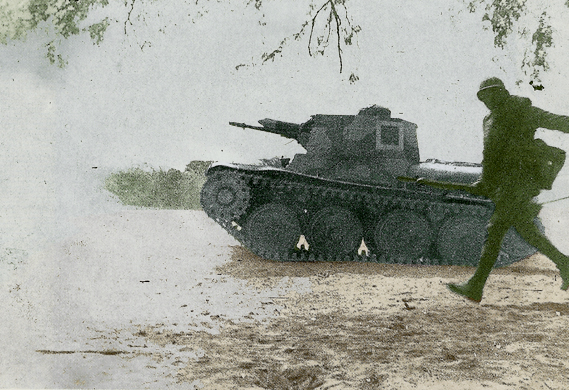
“De Gaulle’s name looms large in France’s history. But the tale of how his niece Geneviève risked her life to liberate and rebuild France has lingered in her uncle’s formidable shadow.”
By Paige Bowers

NINETEEN-YEAR-OLD Geneviève de Gaulle never saw herself as a gun-toting warrior. But when Marshal Philippe Pétain admonished France on June 17, 1940 to lay down its arms and concede defeat to the Germans, the willowy young history student resolved to free her beloved country from the Nazis in any way she could.
If Pétain’s radio address sparked French resistance in Geneviève’s young heart, her uncle – General Charles de Gaulle – kindled the flame with a competing broadcast of his own the very next day. Geneviève, her relatives, and countless others had walked 40 miles to escape incoming German troops when a priest approached their caravan to tell them not to give up hope. He had heard a young French general speak on the radio.
“He said we may have lost a battle,” the priest cried, “but not the war. The General’s name was de Gaulle.”

General de Gaulle’s name, heroism and political legacy loom large in France’s modern history. But the tale of how his niece Geneviève risked her life to liberate and rebuild France has lingered in her uncle’s formidable shadow, even though their stories are forever linked. Both knew resistance was the honorable and only path, no matter where it might lead.
For Geneviève, the journey would test the limits of her endurance and her beliefs in humankind. Her defiance began with small acts such as tearing down swastikas and pro-Vichy posters. But it grew to include ferrying arms and false letters of transit to fellow résistants, and editing and distributing the nation’s largest underground newspaper, Défense de la France.

Despite the near-mythic status of General de Gaulle’s BBC broadcast now, few Frenchmen knew who he was until his niece popularized him in this influential journal. His growing legend made her a target of the Germans, and led to her arrest by a Frenchman collaborating with the Gestapo in July 1943.
Jailed at Fresnes Prison before she was shipped to Ravensbrück concentration camp north of Berlin, this so-called “de Gaulle in miniature” witnessed and endured horrors that could have broken her spirit. Starvation, illness, beatings, shootings, gassings, overwork, cruel medical experiments and a simple lack of hope were all commonplace at this site known as “the women’s hell,” Inmates slept three to a bunk, fought for scraps of food and were mired in their own filth. Yet some of the strongest friendships Geneviève had ever known emerged from this abyss and inspired her future activism.

De Gaulle survived her internment and in June 1945, she co-founded the Association of Deportees and Internees of the Resistance (ADIR), an organization that for 61 years provided female deportees and their families with free medical treatment, soup kitchens, short-term lodging, job training and other social services. Outside of its social work within France, the group waged two internationally renowned battles: one that forced the German government to pay restitution to a group of Polish women on which it had performed crippling experiments at Ravensbrück, and another that forced the French to acknowledge that some of their own had collaborated with the Nazis and turned a blind eye to their cruel acts. Her Uncle Charles loved her like a daughter, but he did not always embrace her public crusades. She would learn to press on without him, always striving to do what she felt was decent, appropriate and humane. She juggled this social work with her roles of wife (she married fellow resister Bernard Anthonioz in 1946, leading her to hyphenate her famous last name) and mother of four.

“I don’t like the word heroism” she later confided to French journalist Caroline Glorion. “And I don’t think that we should seek to have a great life or grand destiny. I think we should seek to do what is right.”
 In May 2015, she was symbolically interred in the Panthéon in Paris with three other resisters, cementing her legacy as one of the country’s great historical figures. She may not have known where her path would lead when she joined her uncle’s fight in 1940, but she always remained true to her ideals.
In May 2015, she was symbolically interred in the Panthéon in Paris with three other resisters, cementing her legacy as one of the country’s great historical figures. She may not have known where her path would lead when she joined her uncle’s fight in 1940, but she always remained true to her ideals.
Paige Bowers is the author of The General’s Niece: The Little-Known de Gaulle Who Fought to Free Occupied France. Follower her on Twitter @PaigeBowers










1 thought on “Geneviève de Gaulle – How the Niece of France Most Famous General Waged Her Own War Against the Nazis”